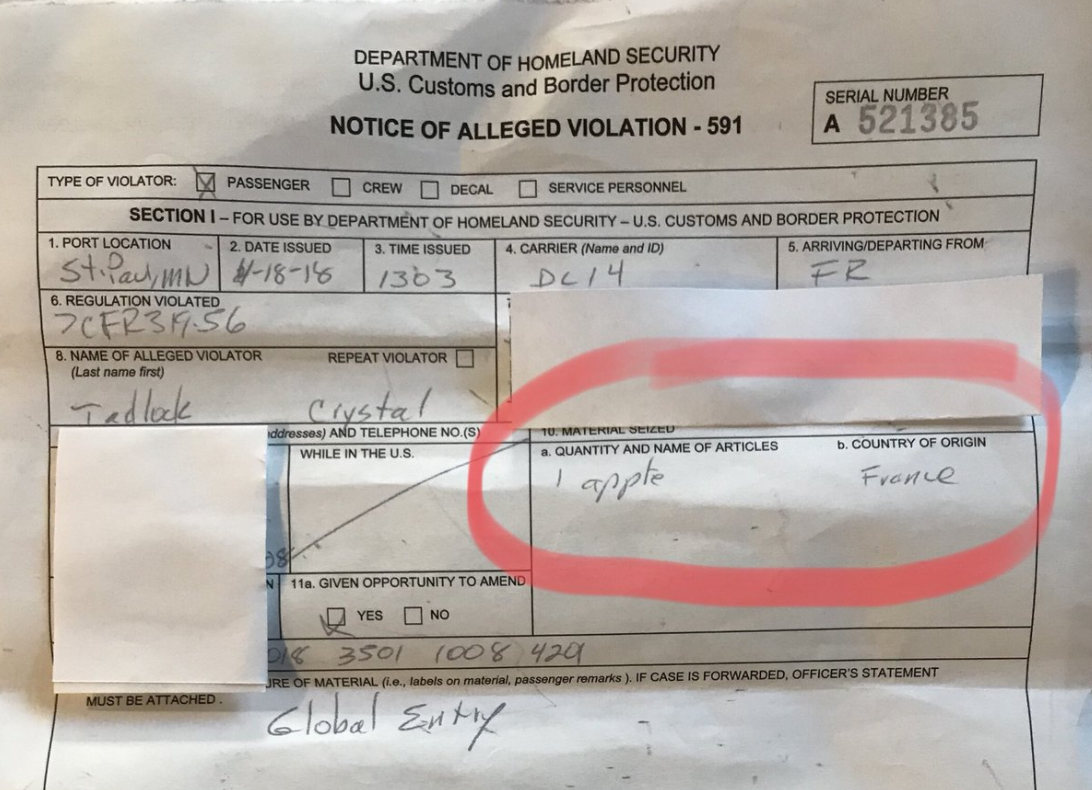Why can't you take food across international borders?

The French are said not to have a word for entrepreneur. But after Presidents Macron and Trump moved ever closer this week, they certainly have one for bonhomie.
Never mind les bons hommes in the White House, though; America is caught up with les mauvaises pommes, the bad apples, which are tainting Franco-American relations.
It started with a Delta flight from Paris, France. One of the passengers aboard DL141 to Minneapolis-St Paul was Crystal Tadlock, who was connecting in the Twin Cities for Denver. Among the food served aboard the nine-hour flight was an apple, sealed in a Delta plastic bag marked ENJOY!
“I did not enjoy the apple,” Ms Tadlock tweeted. “Instead I received a $500 violation, had my global entry revoked (first time I’ve used it) AND I will be searched on every flight for the rest of my life.”
The unfortunate passenger’s mistake was to decide to take the fruit off the plane and through the US Customs and Border Protection checkpoint.
What happened next? The next tweet, directed at Delta, explains.
“Shame on you for handing out apples on your flight that cost $500 customs violation.”
Had I been relieved of the equivalent of £360, I would have been more than miffed. Ms Tadlock directed her social-media anger at the airline.
“Delta apple was from France. I asked the customs agent how he knew it was 100% from France & not an USA apple, he never replied. @Delta representative later confirmed the apple I received was from France.
“Why are they handing out foreign apples?”, demanded Ms Tadlock.
Perhaps because, however unAmerican it might sound, it is standard practice for airlines to cater long-distance flights at their point of origin.
Elle Coco joined the debate, saying: “It’s frustrating Delta hands out foreign apples on their flight that aren’t allowed in the US. Why isn’t Delta using US produce?”
Which, if I may say so, shows some lack of understanding about rules on biosecurity, which have America's agriculture at their core.
Even if the forbidden fruit had been grown in the US and flown, at considerable cost to the airline and the environment, to Paris, it would still be regarded with suspicion by the Animal and Plant Health Inspection Service. They are the people who provide “amnesty bins“ where any foodstuffs absent-mindedly brought into America from the flight can be discarded. Especially French apples from France.
But at the risk of upsetting Ms Tadlock and Ms Coco, some American apples are regarded with suspicion even within the US.
To take any apple grown east of the Rockies into California requires a certificate. The reason: fears of blueberry maggot, plum curculio or Mexican or Caribbean fruit flies infesting agriculture in the Golden State. Citrus fruit from anywhere cannot be brought into California without a permit because of fears about citrus canker. The ban on yams from Texas and the south-east US is because of fears about sweet potato weevil; henceforth the region should be known as the weevil empire.
What is the hapless traveller to do? Just follow a couple of basic rules. Don’t carry unprocessed food, especially meat, dairy products and fruit across international frontiers. And if you see a big sign saying “Do not import foodstuffs,” look for the inevitable bins into which your yam can be lobbed, so inspectors see no weevil.
Happily, there is a big exception: if you bought the food in an EU shop and are not taking it outside Europe, you can cross as many frontiers as you wish. Make the most of this easement in the next 11 months. Beware, though of dairy disappointment caused not by customs officials, but by airport security staff.
Yoghurt in containers bigger than 100ml are banned (and anything smaller is pointless). And last time I flew out of Lyon airport, a harmless hunk of roquefort was confiscated at the checkpoint. Never mind the disparaging US term for the French as “cheese-eating surrender monkeys”: I surrendered the cheese, and next time will travel fromage free.


